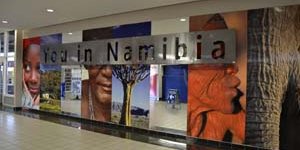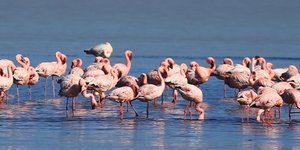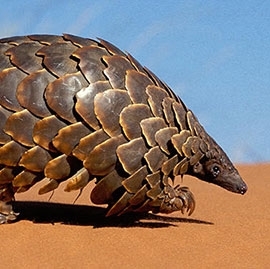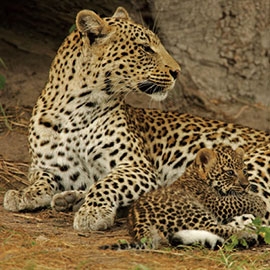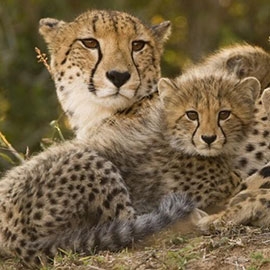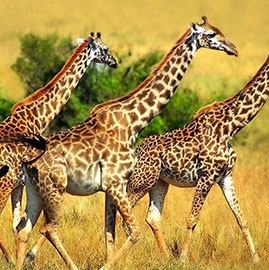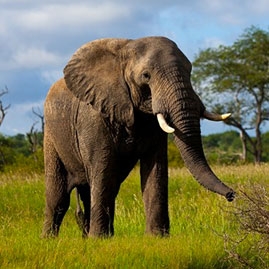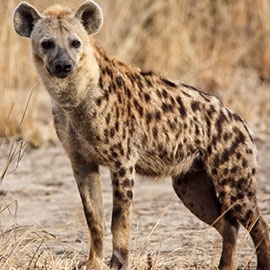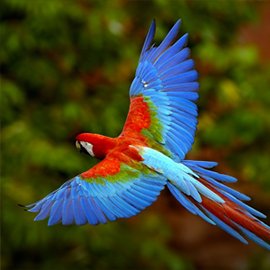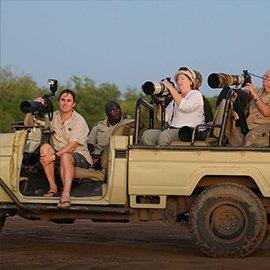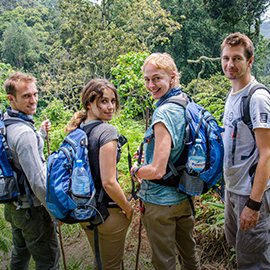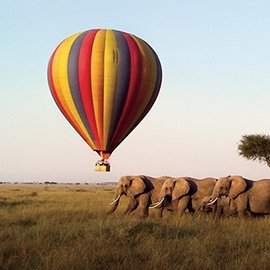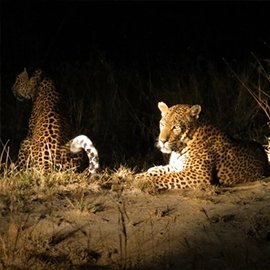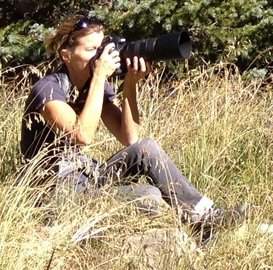Namib-Naukluft National Park
Safari suitability: 7/10
Find your tourFor the intrepid traveler, visiting this glorious landscape is like celebrating Halloween on the moon. With zebras.
What YAS members think
Highlights
- Home to the Namib—the world’s oldest desert
- Largest conservation park in Africa
- For the bird enthusiasts and ornithologists, Sandwich Harbour a key wetland for waterbirds, flamingoes and cormorants among them
- Orange sand dunes of Sossusvlei, the forest of Dead Vlei and the Naukluft Mountains
- Large mammals include Hartmann’s mountain zebra, giraffe, gemsbok, springbok, leopard and cheetah
About Namib-Naukluft National Park
Situated on the west coast of Namibia, beautiful, orange-duned Namib-Naukluft National Park is home to the Namib, considered by many to be the world’s most ancient desert. Established in 1907, vast, 50,000 km² (19,000 mile²) Namib-Naukluft is the largest conservation park in Africa. Its wetlands couch bird-wealthy marine sanctuary Sandwich Harbour, and its deserts boast the magnificent sand dunes of Sossusvlei, the haunting, clay-bed-based forest of Dead Vlei, the Naukluft mountain range and several cutting canyons.
Not to be missed are spectacular Sossusvlei’s haunting, rust-colored dunes—among the world’s tallest and most spectacular--and its leafless forest of dead, sun-scorched camel thorn trees. Fog blown in off the Atlantic Ocean accounts for most of the desert’s moisture and the winds that blow it for the dunes’ oxidized hue. Jackal, hyena, raptors, snakes, scorpions and myriad other tough beasts, birds, reptiles and insects have adapted to living in the region’s desert, and lichens, succulents and grasses contribute to the park’s botanical abundance. Large mammals protected in this park include Hartmann’s mountain zebra, giraffe, gemsbok, springbok, leopard and cheetah.
While much of the park is not accessible, visitors to this wondrous place can plan to slide down sand dunes, embark on rugged hikes, photograph, 4x4, stargaze and camp (the park’s only in-house accommodations are basic campsites). The dunes’ colors are finest at sunrise and sunset.
When is the best time of year to visit Namib-Naukluft National Park?
Most consider April to October the best months to visit, followed by the dry winter months of July to September. High summer temperatures mean that hiking is only permitted between March and October, and the park receives 106 mm (4.1 inches) of rainfall each year, generally in February and April. Sandwich Harbour does not allow camping and is open to visitors—4x4 vehicles only—before and after dark. No angling is allowed between the end of January and mid-April.
Namib National Park is an adventure of a lifetime. After spending a days photographing the beautiful red dunes, you'll agree too. The Namib-Naukluft National Park is located in SW Namibia ending at the Atlantic Ocean. I recommend a plane or helicopter ride while you're there to really see the vastness of the Dunes. I didn't go to sand dunes to see wildlife, I went for scenic photography, but did get some wonderful photos of wildlife on the dunes thanks to a natural history tour I took with Tommy's Tours & Safaris. Make sure you go with the original as there is an impostor.
Sort by:
Wonderful tour coordinated by San-Mari and led by guide, Lucky. Both were outstanding, responsive and knowledgeable. Especially beautiful were the oryx.
The Namib Desert in my opinion is one of the worlds most beautiful landscapes. This desert is home to towering red dunes, craggy mountains, huge skies, iconic vistas and a surprising array of hardy wildlife. The Namib-Naukluft National Park is huge, sprawling over 50,000 square kilometres. Luckily, parts of it are surprisingly accessible. There are a number of accommodation options close to Sesriem and one can also camp just within the park. This forms the ideal base to explore the parks most famous sites including Deadvlei, Sossusvlei, Dune 45, and Sesriem Canyon. Visiting Deadvlei, where the skeletons of dead trees stand guard eerily over cracked white clay and towering red dunes, requires a 20-minute walk from the parking area. Big Daddy is a dune towering high over Deadvlei. Many people climb it for sunrise or sunset photo opportunities. Nearby Sossusvlei is also worth a stop. Its a large pan that very occasionally fills with water. Like Deadvlei, its surrounded by towering dunes, and its fun to climb one for an amazingly expansive view of dune fields that seem to go on forever. One can self-drive the route, but doing a tour with an experienced guide will give you more insight into the area and also open your eyes to the amazing array of wildlife that calls the desert home. The park offers great photographic opportunities of the amazing landscape, and the area is also home to Hartmanns zebra, giraffe, brown hyaena, springbok, bat-eared fox, cape fox, klipspringer and oryx. Birding the park offers the opportunity to see some of Namibias special desert adapted birds, with dune lark being seen in the park - this is Namibias only true endemic bird and the park is a good place to see this bird. Other species include Ruppell's korhaan, Ludwigs bustard, Namaqua sandgrouse, Monteiro's hornbill, dune lark, black-eared sparrow-lark, scaly-feathered finch and dusky sunbird. Ensure you have plenty of water for any of the walks, take your camera and fall in love with the amazing desert. This is a must stop on a tour of Namibia.
 South Africa
South Africa
The Namib desert is up there with the worlds most beautiful landscapes. Its home to towering red dunes, craggy mountains, huge skies, iconic vistas and a surprising array of hardy wildlife. The Namib-Naukluft National Park is huge, sprawling over 50,000 square kilometres. Luckily, parts of it are surprisingly accessible. We visited in January during a weeklong circuit through central Namibia. Our first stop was in the Naukluft Mountain Zebra Park for a night at Naukluft campsite, nestled between the mountains. This is a stunning place for a stopover on the way between Namibias capital, Windhoek, and Sesriem, the main gateway into the Namib. At Naukluft, the Waterkloof Trail is well worth exploring. It follows the river past several rock pools, interesting vegetation, and imposing cliffs. Watch out for baboons at the camp. We dutifully followed the receptionists advice and waited until sunset to set up camp. Even so, we had a large male baboon come right up to our truck and steal a bag of potatoes while we stood around, helpless to stop him. On the two-hour drive from Naukluft to Sesriem, the Namib desert reveals itself. We camped at the Sesreim campsite situated just inside the border of the national park. This is the main base from which to explore the parks most famous sites including Deadvlei, Sossusvlei, Dune 45, and Sesriem Canyon. The campsite is very pleasant with a good amount of spacing between sites, trees for shade, a pool, and a convenient shop and restaurant. At night in camp, be careful of scorpions. Scorpions glow under ultraviolet light, so consider taking a UV flashlight to be able to check your surroundings. From the campsite, its a good idea to get up before sunrise to get into the heart of the park for the best light and coolest atmosphere. There is a single, 60-kilometer-long tar road heading straight into the park. There are a few pull-offs along the road for various hiking routes and famous landmarks. But, head all the way to the end of the road for the parks most awe-inspiring scenesDeadvlei and Sossusvlei. The trick here is that the last few kilometres of the road require a 4x4. The paved road gives way to deep sand, and we saw many stuck 4x4s. Remember to let down the tire pressure to travel more easily over the sand and engage the locking hubs if the vehicle requires. Make sure to keep up momentum over the deepest areas of loose sand to avoid getting bogged down. If you do get stuck, gently roll backwards and forwards rather than spinning tires at top speed. Visiting Deadvlei, where the skeletons of dead trees stand guard eerily over cracked white clay and towering red dunes, requires a 20-minute walk from the parking area. The trail isnt well marked, but it should be possible to follow the previous hikers footprints through the loose sand. If youre the first to arrive in the morning after a windy night, head out in a line perpendicular to the parking lot. Make sure to bring plenty of water, sunscreen and sturdy shoes. Big Daddy is a dune towering high over Deadvlei. Many people climb it for sunrise or sunset. Nearby Sossusvlei is also worth a stop. Its a large pan that very occasionally fills with water. Like Deadvlei, its surrounded by towering dunes, and its fun (but hard work!) to climb one for an amazingly expansive view of dune fields that seem to go on forever. In January, conditions were very warm, so hiking the dunes at noon was a sweaty affair. A good midday activity is to head back to camp at Sesriem for a visit to Sesriem Canyon. Here, the steep walls provide some shade for the canyon floor below. Afterwards, you can cool off in the pool. Nearby Elim Dune is a good spot to watch the sunset.
Anybody in love with desert landscapes should visit the park, best hours, of course, early morning and at dawn. Sandy stretch arriving to Sossusvlei can be tricky, be careful with your driving!
The Namib Desert with its massive dune fields was recently inscribed on the UNESCO World Heritage site as the 'Sea of Sand'. Stunning beauty of this desert region of Namibia is overwhelming! At Sossusvlei: huge sandy dunes stand tall over clay floor of Dead Vlei and hidden valleys. Blue, white and orange colors blend creating tri-color desert scenery unequal to anything I've seen on my journeys. Ancient, dried-up acacias stand etched in the moisture-less floor evoking quiet an impression on each visitor! Equally to Etosha National Park, Sossusvlei and dead Vlei are not to be missed while visiting Etosha!
"The Earth is not ours, it is a treasure we hold in trust for future generations". This was one of the first pieces of wisdom given to me by my Ju'Hoansi guide during my visit to Namib-Naukluft National Park. And as we both stood there, I looked peered around at the towering dunes, I knew exactly what he meant. Namibia is a country of extremes, and nowhere is it more obvious than in Namib-Naukluft National Park. The sand dunes here are some of the tallest in the world, some reaching upwards of a 1000 feet! It's also the largest National Park in Africa, the fourth largest in the world. But the most incredible thing about this park, it its home to the oldest desert in the world (as old as 80 million years old!!!). My party and I were led on a guided tour of Dead Vlei and Sossusvlei, ancient salt pans riddled with the ghosts of dead acacia trees. The scenery was so eerie, I had to crouch down for a moment, rub my eyes, and remind myself that it was all real. You know that 'ol saying, the "sounds of silence"...everything was a whisper, the sands absorbed all sound. I learned about the "San" people, and their unique relationship with the desert. How they would sleep out on the dunes, never worried about the scorpions, snakes or spiders that lurked beneath the surface. And how they would find small springs, eat lizards, and know what desert plants were safe to eat - it was fascinating! At the end of the day, just before sunset, we ascended Dune 45, arguably the most photographed Dune in the world, and I soon realized why. Its shape is exquisite, and the view from the top was breathtaking. Despite not seeing too many animals, the occasional gemsbok, the desert was full of life. It's a place I will NEVER forget.
I'd always wanted to see Sossusvlei, ever since I'd seen some of the lunar-like photos my friend took on her trip a few years ago. I finally got my chance two Christmases ago. I went with a few photographer friends. We hired a car in Cape Town and drove up in the scorching heat. In retrospect, December may not be the most ideal time to visit Namib-Naukluft. It was HOT. I mean HAWT. And, the sand was essentially a mirror, reflecting the hot African sun right back at us. We were up very early to photograph the dunes and the dead trees, but so was EVERYONE else and their digital SLR. The famous Dune 45 was our destination (again, it was everyone's destination). If you want to get a great shot of this dune without anyone else in the photo, the offseason may be better. What they don't tell you is the dunes make a sort of odd noise as you compress the hot sand with your feet. Let's just say it could be misconstrued for another noise. Despite the crowds and touristy feel, I got some great shots and enjoyed it. It's not really a destination for big game, though.
Sossusvlei is a sea of dunes, there is no other more descriptive word for the area. The first time I visited Sossusvlei I was on a self drive by myself and I had to keep stopping so that my brain could assimilate what I was seeing. The red red dunes of Sossusvlei seemed to stretch for eternity. The best time to see the dunes is in the very early morning as the sun is rising in order to capture stunning photographs of a sand dune with one side a brilliant crimson red and the other side a deep luxurious purple. It is a landscape photographers ultimate dream.
I had the pleasure of visiting Namibia in 2010, and I'm still enchanted by this park. Let me start by saying that I saw very little wildlife in this park, but that didn't matter in the slightest. The landscape is just amazing. The red dunes and blue, blue sky look almost unreal. Most people try to get to the park when the gates open at 5am and then head for Dune 45, which is a large dune you can climb to see the sunrise. We did this, and it was a great start to the day. You will more than likely have to share the view with a bunch of other tourists, but what a view! We then headed to Sossusvlei and Deadvlei. These famous vleis are both haunting an beautiful. Be sure to take some time to just soak up the atmosphere - it's easy to arrive with a camera in hand and just snap away, but sometimes you forget to just enjoy the spectacle. Of course you can't forget your camera - this place presents one of the world's best photo opportunities! We also took a hot air balloon during our stay here, and it was spectacular. To see the flat desert from the sky, and the fascinating 'fairy circles' that dot the land. I don't describe many places as 'breathtaking' but this is one of them. It's not your typical safari, but it's fantastic.
A great photographic safari destination is Sossusvlei with its amazing sand dunes in the Namib Desert in Namibia. It offers: Mind blowing landscapes, Great aerial photography with hot air ballooning Great colours Not so much wildlife, yet great opportunities to photograph desert adapted animals Great opportunities for team building activities Wildlife photography courses Self-drive is possible, but guided tours are recommended to find the best spots easily and to focus entirely on photography.
Driving to Namib-Naukluft
If you are arriving at Windhoek's international airport and planning on hiring a car, the drive will take you around four hours and 40 minutes, in normal conditions.
The following airlines travel to Namib-Naukluft National Park

The company is registered as Nomad Aviation (Pty) Ltd trading as Bay Air Aviation, with administrative offices in the coastal town of Walvis Bay and the operational hub at Eros Airport, Windhoek. The company is known to offer charters and scheduled flights, transporting of passengers and freight in Namibia and neighboring states, using light to medium class aircraft. In addition to operating in Namibia the company has completed contract work in Angola, Congo, Niger as well as South Africa using mostly King Air 200s, Beechcraft 1900s and Cessna Grand Caravans. Bay Air has been operating scheduled air services between Walvis Bay and Windhoek Eros as well as Windhoek and Johannesburg for the past 8 years. It is an aircraft charter company specializing in scheduled and non-scheduled air transport. The two directors, its founding members, have been in business since 1989. Visit website
Also flies to:




Westair Aviation is a fully integrated aviation service provider and airline based in Windhoek, Namibia. Having started out as an aircraft maintenance facility 50 years ago in 1967, Westair Aviation has grown to become the most experienced aviation company in Namibia. Today the Westair Aviation fleet consists of more than 30 aircraft suitable to conduct any mission across Africa. Offering a wide range of specialised aviation services, Westair Aviation provides tailored aviation solutions of the highest standards to discerning customers. Westair Aviation offers the following services: Aircraft Charters Aircraft Leasing Specialised Aviation Services Medical Evacuation and Air Ambulance Geophysical Surveys Flight Training Aircraft Management and Consulting Offshore Support Visit website
Also flies to:



Wilderness Air is proud to be the air partner of Wilderness Safaris, a responsible ecotourism and conservation company with private access to the finest wilderness and wildlife areas of southern Africa. Wilderness Air began operating in 1991, with one aircraft based in Botswana servicing two camps in the Okavango Delta. Today, Wilderness Air is also based in Namibia, Zambia and Zimbabwe, operating over 35 aircraft and employing over 50 pilots. Throughout its time, it has maintained its excellent reputation for safety and guest service. We operate a varied fleet of light aircraft, chosen for their ability to transport visitors comfortably to remote wilderness destinations with dirt airstrips. Each aircraft type has been selected based on its ability to transport different numbers of passengers, over different ranges. Our fleet operates on a daily circuit within the regions. Wilderness Air is privileged to fly into some of the most pristine wilderness areas in the world. We believe that flying is an integral part of each guest's travel experience and that our pilots' passion and professionalism can make a genuine contribution to journeys that change lives. Visit website
Also flies to:




Namib-Naukluft map
Related articles
Latest photos



 United States
United States
 Namibia
Namibia
 Spain
Spain
 Canada
Canada
 United Kingdom
United Kingdom
